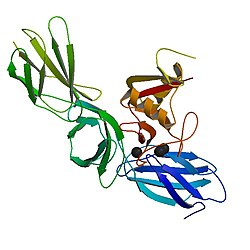Proteoglycan
The chains are long, linear carbohydrate polymers that are negatively charged under physiological conditions due to the occurrence of sulfate and uronic acid groups.Proteoglycans are a major component of the animal extracellular matrix, the "filler" substance existing between cells in an organism.[5] They are also involved in binding cations (such as sodium, potassium and calcium) and water, and also regulating the movement of molecules through the matrix.First, a special link tetrasaccharide is attached to a serine side chain on the core protein to serve as a primer for polysaccharide growth.Mutations in the gene encoding the galactosyltransferase B4GALT7 result in a reduced substitution of the proteoglycans decorin and biglycan with glycosaminoglycan chains, and cause a spondylodysplastic form of Ehlers–Danlos syndrome.
peptidoglycanglycoproteinglycopeptideAggrecancartilageamino acidsproteinsglycosylatedproteincovalentlyglycosaminoglycanserinechondroitin sulfateprolinesulfateuronic acidconnective tissuechondroitin sulfatedermatan sulfatedecorinbiglycanHeparan sulfate proteoglycanheparan sulfatetesticanperlecanbetaglycanChondroitin sulfate proteoglycanbikuninneurocanversicanbrevicankeratan sulfatefibromodulinlumicanextracellular matrixhyaluronancollagencationssodiumpotassiumcalciumribosomestranslocatedrough endoplasmic reticulumGolgi apparatusenzymaticvesiclesgenetic disordersmucopolysaccharidoseslysosomalB4GALT7proteoglycansEhlers–Danlos syndromeMedical Subject HeadingsBibcodeglycoconjugateglycoproteinsglycopeptidesMucoproteinsMUC5ACHaptoglobinIntrinsic factorOrosomucoidPhytohaemagglutininOvomucinChondroitin sulfate proteoglycansPlatelet factor 4Structural maintenance of chromosomes 3KeratocanSyndecan 1Activin and inhibinAlpha 1-antichymotrypsinApolipoprotein HAsialoglycoproteinAvidinB-cell activating factor4-1BB ligandCholesterylester transfer proteinClusterinColony-stimulating factorHemopexinLactoferrinMembrane glycoproteinsMyelin protein zeroOsteonectinProtein CProtein SSerum amyloid P componentSialoglycoproteinGlycophorinGlycophorin CThrombopoietinThyroglobulinThyroxine-binding proteinsTranscortinTumor necrosis factor alphaUteroglobinVitronectin